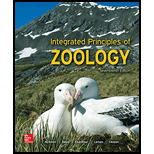
Concept explainers
To explain: The utility of the radial symmetry for free-floating animals and sessile.
Introduction: The Cnidarians are a phylum of simple animals. It includes jellyfish, hydras, corals, and sea anemones. The Cnidarians are divided into major classes, namely the Scyphozoa, Anthozoa, Staurozoa, and Hydrozoa.
Explanation of Solution
The body plans of most multicellular organisms exhibit some form of symmetry. It includes whether bilateral or spherical and radial. The radial symmetry is suitable for slow-moving organisms such as starfish and free-floating animals such as jellyfish. Especially, the radial symmetry is suitable for sessile animals.
The presence of radial symmetry allows an organism to interact with environments in all directions from one point. The radial symmetry is useful because the animals can just sit down and grab food from all the directions.
The radial symmetry also helps the animals to receive stimuli from all the directions. Thus, it builds up an efficient and strong defense mechanism. Therefore, the presence of radial symmetry is useful for both free-floating and sessile animals.
Want to see more full solutions like this?
Chapter 13 Solutions
LooseLeaf for Integrated Principles of Zoology
- please draw in what the steps are given. Thank you!arrow_forwardplease draw in and fill out the empty slots from image below. thank you!arrow_forwardThere is a species of eagle, which lives in a tropical forest in Brazil. The alula pattern of its wings is determined by a single autosomal gene with four alleles that exhibit an unknown hierarchy of dominance. Genetic testing shows that individuals 1-1, 11-4, 11-7, III-1, and III-4 are each homozygous. How many possible genotypes among checkered eagles in the population?arrow_forward
- students in a science class investiged the conditions under which corn seeds would germinate most successfully. BAsed on the results which of these factors appears most important for successful corn seed germination.arrow_forwardI want to write the given physician orders in the kardex formarrow_forwardAmino Acid Coclow TABle 3' Gly Phe Leu (G) (F) (L) 3- Val (V) Arg (R) Ser (S) Ala (A) Lys (K) CAG G Glu Asp (E) (D) Ser (S) CCCAGUCAGUCAGUCAG 0204 C U A G C Asn (N) G 4 A AGU C GU (5) AC C UGA A G5 C CUGACUGACUGACUGAC Thr (T) Met (M) lle £€ (1) U 4 G Tyr Σε (Y) U Cys (C) C A G Trp (W) 3' U C A Leu בוט His Pro (P) ££ (H) Gin (Q) Arg 흐름 (R) (L) Start Stop 8. Transcription and Translation Practice: (Video 10-1 and 10-2) A. Below is the sense strand of a DNA gene. Using the sense strand, create the antisense DNA strand and label the 5' and 3' ends. B. Use the antisense strand that you create in part A as a template to create the mRNA transcript of the gene and label the 5' and 3' ends. C. Translate the mRNA you produced in part B into the polypeptide sequence making sure to follow all the rules of translation. 5'-AGCATGACTAATAGTTGTTGAGCTGTC-3' (sense strand) 4arrow_forward
 Biology: The Dynamic Science (MindTap Course List)BiologyISBN:9781305389892Author:Peter J. Russell, Paul E. Hertz, Beverly McMillanPublisher:Cengage Learning
Biology: The Dynamic Science (MindTap Course List)BiologyISBN:9781305389892Author:Peter J. Russell, Paul E. Hertz, Beverly McMillanPublisher:Cengage Learning Biology 2eBiologyISBN:9781947172517Author:Matthew Douglas, Jung Choi, Mary Ann ClarkPublisher:OpenStax
Biology 2eBiologyISBN:9781947172517Author:Matthew Douglas, Jung Choi, Mary Ann ClarkPublisher:OpenStax
 Biology (MindTap Course List)BiologyISBN:9781337392938Author:Eldra Solomon, Charles Martin, Diana W. Martin, Linda R. BergPublisher:Cengage Learning
Biology (MindTap Course List)BiologyISBN:9781337392938Author:Eldra Solomon, Charles Martin, Diana W. Martin, Linda R. BergPublisher:Cengage Learning Concepts of BiologyBiologyISBN:9781938168116Author:Samantha Fowler, Rebecca Roush, James WisePublisher:OpenStax College
Concepts of BiologyBiologyISBN:9781938168116Author:Samantha Fowler, Rebecca Roush, James WisePublisher:OpenStax College





